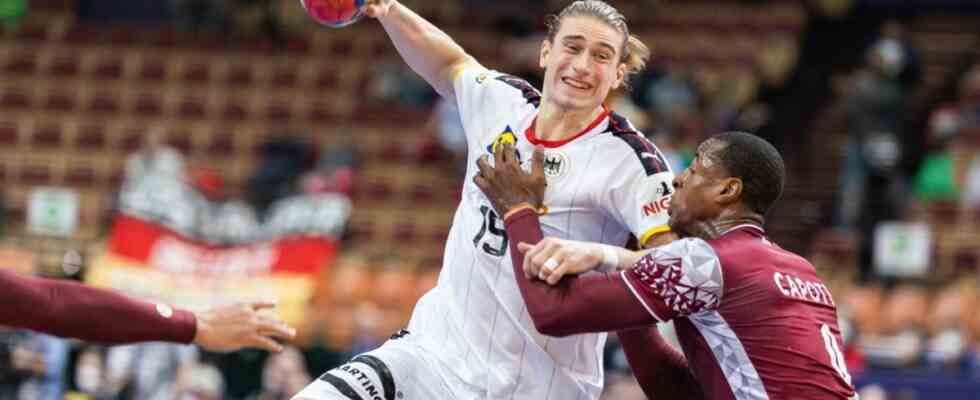Philipp Weber had no doubts. Immediately after the work was done, he said he never feared “that things could go the other way”. Because he plays in a team that is now so solid that “even phases like this can’t blow us away”. The national handball player meant the 25:26 goal by Ahmed Nader Saleh, who again put the German team under pressure in their World Cup opening game against Qatar in Poland and Sweden. In dire straits, as coach Alfred Gislason found in contrast to his experienced backcourt player: “Of course it got dicey again.”
Ultimately, however, there was a deserved 31:27 win against this previously difficult opponent, which also meant a successful start to the tournament. The record against the Persian Gulf team was negative before the game, Qatar knocked the German selection out of the competition at the 2015 and 2017 World Cups, and in the meantime the DHB team had retaliated at the Olympics in Rio. “Now it’s 2: 2,” Weber calculated with a grin, ultimately only the two points would count anyway: “We really wanted to win the game, we did that and now we can put a stop to it.”
This is probably the most sensible approach, but the coach will still have something to discuss with Weber and colleagues. Of course, the Qatari were an uncomfortable and largely unknown opponent, but this team did not have much in common with the back then.
At the time, Qatar had secured the services of a whole series of top-class legionnaires through naturalization and lavish salaries, but they are getting on in years, such as Rafael Capote, who used to cause serious trouble for the Germans. Although the naturalized Cuban scored five goals, at the age of 35 he had to take breaks from time to time. Qatar’s successful Spanish coach Valero Rivera, who became world champion with Spain in 2013, inevitably relies more and more on local forces, which is still enough to make a “very, very good team”, as Weber assured. But the German team was clearly better.
The naturalized top players are getting old, Qatar’s coach has to rely on local handball players
Led by playmaker Juri Knorr, the DHB selection dominated the first half at will. Although the Rhein-Neckar Löwen playmaker is the youngest in the team at 22, he led the game with a great overview, always exuded a goal threat, played clever passes to the circle, staged the team-mates and set the pace. Knorr is emerging as the long-missing international-class game designer. In addition, another stylistic device that the German selection had lost in the past tournaments worked as it did in the best of times: the counterattack.
Either the Germans overran the opponent with a powerful second wave, or the wingers Lukas Mertens and Patrick Groetzki were served millimeter-precise passes from goalkeeper Andreas Wolff, which they each refined with four goals. The goalkeeper was the third important factor in the team, Wolff parried at the level that you have to show on the international stage to go far in a tournament. The 31-year-old limped off the field shortly before the end, but an ultrasound scan in the dressing room gave the all-clear: team doctor Philip Lübke diagnosed a slight strain that had to be repaired before the next game against Serbia on Sunday (6 p.m.).
Because the veteran Kai Häfner also proved to be a reliable scorer in the right backcourt (5 goals) and the defense around the middle block with Johannes Golla and Julian Köster did not allow much, the DHB team went into the dressing room with a reassuring 18:13 lead – which only left the question of why it wasn’t even clearer.
“We can’t afford such a dent against Serbia”: national coach Alfred Gislason.
(Photo: Marco Wolf/Wolf-Sportfoto/Imago)
The coach received the answer after the break, which Weber put as follows: “We played a fantastic game for 45 minutes and didn’t give Qatar a chance, then we’ll deprive ourselves of our reward because we let them come back.” That’s the big shortcoming of this team, which plays excellently at the beginning, only to then throw themselves out of step and bring the opponent back into play with mistakes that are difficult to explain. “Unfortunately, that was a parallel to the friendlies against Iceland,” said captain Golla, “we play a great first half, come out of the dressing room sleepy, make a few simple technical mistakes, give away free throws and then a team like Qatar is in capable of catching up and putting us under pressure.”
At least the team kept their nerve this time, goals from Weber, Jannick Kohlbacher and two powerful shots from Knorr ended the Qatari’s chances of success. Nevertheless, coach Gislason knows that you should give up such weak phases against Serbia, which won their opening game against Algeria 36:27: “A really good team, in attack and defence, they have a very good mix of old and young players, a very good width in the squad and an outstanding goalkeeper, we can’t afford a dent like today.”

